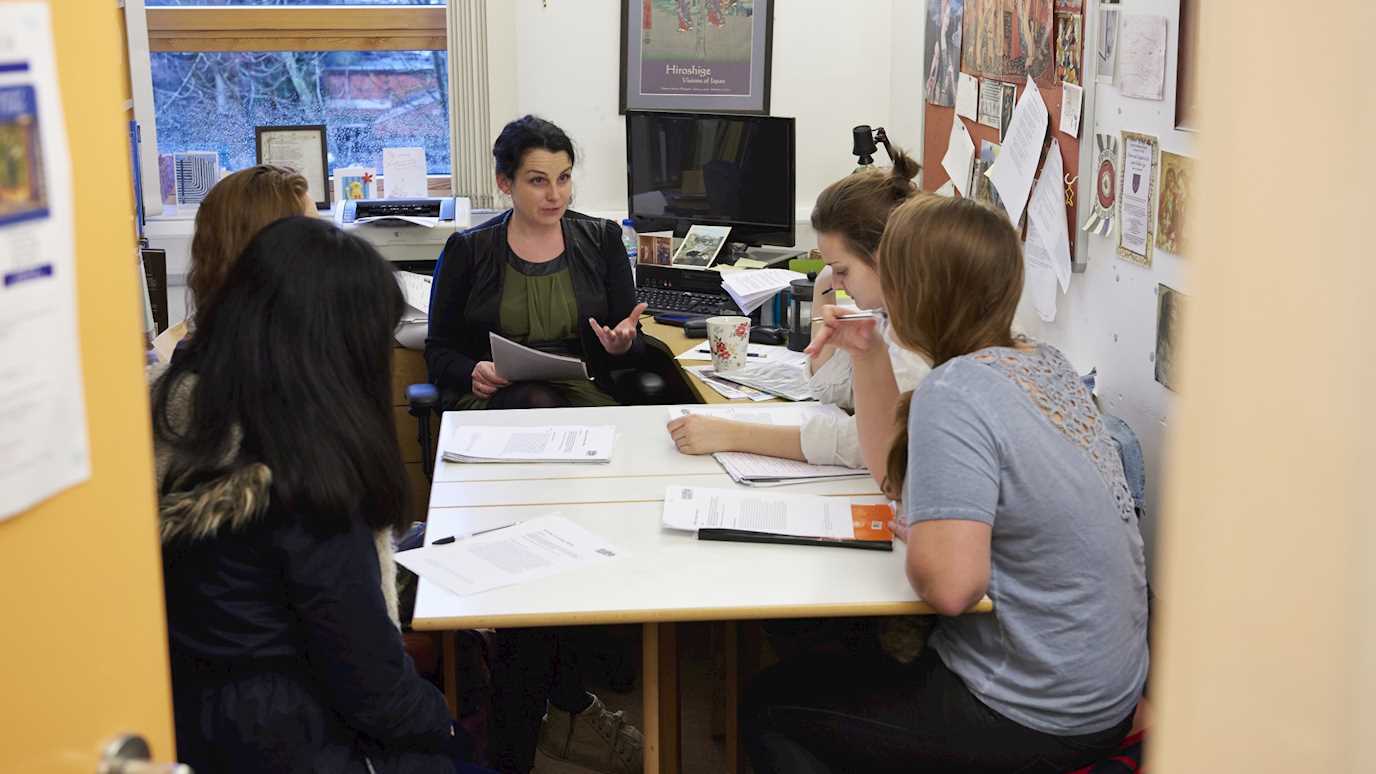An International Reputation for Advanced Research
We have an excellent record of MA and PhD completion and a thriving postgraduate community with a variety of events, reading groups, and researcher development opportunities. We have excellent research facilities, including a number of online resources and the largest library in the University of London.
Find out more about our research
Students are supervised in the Department for the degrees of MPhil and PhD, awarded by the University of London. Applications for funding should be made through the TECHNE scheme. Please note that the departmental deadline for TECHNE applications for 2021 entry has passed. The deadline for applications to TECHNE for September 2022 entry is January 7, 2022. Prospective applicants should contact potential supervisors in October or early November of the Autumn term. We consider applications for unfunded PhDs at any time of year.
Applicants should fill in both a college application form. TECHNE applicants should also complete an online TECHNE application form.
It is possible to study either full- or part-time. Our start dates are September or January each year, though we prefer the former.
For any research enquiries, contact Deana Rankin, PGR Lead English at deana.rankin@rhul.ac.uk
Please also see below on this page for more details about funding and the application process.
The English PhD
We have around 50 PhD students researching topics across the full range of English literary studies, Creative Writing, and Poetic Practice. The Department of English supports a significant body of postgraduate students developing Practice-based PhDs, in which a component part of the research involves producing a body of creative work.
MA by Research
We also offer a Master’s by Research, which can serve as an alternative to the traditional taught MA, whether as a pathway to PhD study or as an independent research qualification. In the course of this one-year (or two-year part-time) degree, you will work towards a dissertation of up to 40,000 words. This is an extended independent research project pursued with the support of a supervisor. You will receive training in research skills, and have access to the wide range of other training opportunities available in the university, including the Researcher Development Programme (RDP).
There is also a taught module which focuses on developing research skills, hosted by the Department of Languages, Literature and Culture. As this course is taught in Autumn term, it is generally expected that the MA by Research will begin in Autumn term, although we may consider Spring term starts where there are exceptional reasons to do so.
Research community
There is considerable opportunity for research students to work together at Royal Holloway; doctoral students participate in and lead a variety of research seminars, including the Contemporary Innovative Poetry Research Seminar, the Shakespeare Reading Group, the Nineteenth-Century Reading Group, the London 19th Century Studies seminar, and the Finnegans Wake Research Seminar.
Encouragement and support is given to students who wish to present their work at or run conferences. Creative writing and practice-based students also find numerous platforms to disseminate their work. The Faculty of Arts and Social Sciences runs a lively series of seminars, workshops and lectures for practice-based students. Discipline-specific research training is available through departmental, Faculty and College programmes.
Victorian Studies
The English department is home to two high-profile Research Centres. Our long-standing Centre for Victorian Studies is one of the leading international centres for Victorian research, with many of its events held in the stunning picture gallery, which houses a world-famous collection of Victorian art.
Royal Holloway is an award-winning centre for Victorian postgraduate training, moreover, each year hosting the residential London Victorian Studies Colloquium which brings together aspiring Victorian academics from all parts of the UK and beyond as well as masterclasses.
We are a centre of excellence for research on Dickens and offer unrivalled opportunities for aspiring Dickensians: we have an official partnership with the Dickens Museum and are a member institution of influential the Californian consortium, the Dickens Project.
Among other benefits, this means that each year a postgraduate student is funded to attend the Dickens Universe conference in Santa Cruz, the biggest annual gathering of Dickensians in the world. We are the only member institution in London and one of the few in the UK.
Poetics Research
Our Poetics Research Centre is a leading forum for the investigation of contemporary poetry, embracing the following strategies of writing – innovative and experimental writing, hybrid poetics, sound, bookarts, live-art, digital writing, installation, performance writing – as they are conceived in the framework of modernist and contemporary writing and critical theory.
The Centre runs numerous events. These include the Contemporary Innovative Poetry Research Seminar at Senate House, a seminar series run in collaboration with colleagues at Kent’s Modern Poetry Centre, the Praxis reading series and various one-off colloquia, readings and discussions. Research Centre staff teach on the well regarded Poetic Practice MA, and are currently supervising several PhDs. PGR students working within the areas of enquiry addressed by the Research Centre are eligible to become associates.
Graduate conference
Our annual PGR conference takes place every year in early November. Prospective students are welcome to attend. Please email Dr Danielle Sands for details.
Applying for a PhD
We welcome postgraduate applications from students who have or are about to obtain an MA in an appropriate subject, but candidates with degrees in other subjects or with relevant publications will be considered. We usually expect students to have achieved at least a 2:1 or equivalent in their first degree.
Overseas applicants should have a degree of equivalent standard and must possess an excellent level of competence in spoken and written English. (Required IELTS scores are 7 overall with 7 in writing, and no remaining subscore to be below 5.5 if the applicant requires a student visa.)
Students are initially registered for an MPhil degree and transfer to PhD on satisfactory completion of the upgrade process. Full-time PhD students are expected to complete their degree in three years (with a fourth and final year for writing up). Part-timers have twice the time to complete their degree.
Contacting a supervisor
We recommend that you first consult the staff research pages and look through the research profiles of our academic staff involved in supervision. It is worth determining whether your research interests resonate with any of the specific areas of interests outlined and, if so, to emphasise this in your application.
You may consider sending a preliminary research proposal to a potential supervisor ahead of completing your formal application. In addition to this preliminary proposal, you may, if you plan to do a practice-based PhD, also choose to send a writing sample. Sending out material in this manner will offer you a sense of whether your proposed area of research matches the specific expertise and interests of any potential supervisor(s) with whom you might like to work. Alternatively, should you decide to go straight into the formal application procedure, your proposal will be circulated to all potential supervisors for consideration. Cross-departmental supervision is available for viable interdisciplinary projects.
Writing a research proposal
Although there is no set model for how to put together your research proposal, the following is a basic outline of what you might include:
- Synopsis;
- Research questions and contribution to knowledge;
- Background to research, including key literature;
- How the proposal relates to this context;
- Methods and approaches used;
- Draft timetable;
- Indicative bibliography.
Funding opportunities/TECHNE
Those intending to study for a PhD in the Department of English are able to apply for Arts and Humanities Research Council (AHRC) studentships and for College Studentships. Please visit our TECHNE Applications and Funding page for more information on how to apply. College studentships are allocated to the strongest unsuccessful TECHNE applicants, as defined through our ranking system. Funding for non-EU overseas students is limited to a very small number of fee waivers allocated by the Faculty. There are currently no maintenance funds available for non-EU overseas students.
Please note that the departmental deadline for TECHNE applications for 2019 entry has passed. The deadline for applications to TECHNE for September 2020 entry will be in January 2020. Applicants should fill in both a college application form and an online TECHNE application form. Please also submit a pdf of the TECHNE form to English.PGAdmissions@rhul.ac.uk.
Books by recent PhD students
- Michael Wainwright, Toward a Sociobiological Hermeneutic: Darwinian Essays on Literature (Palgrave, 2012)
- Farah Karim-Cooper, Cosmetics in Shakespearean and Renaissance Drama (Edinburgh University Press, 2012)
- Farah Karim-Cooper and Tiffany Stern (eds), Shakespeare's Theatres and the Effects of Performance, The Arden Shakespeare (Bloomsbury, 2013)
- Sam Halliday, Sonic Modernity (EUP, 2013)
- Farah Karim-Cooper and Andrew Gurr (eds), Moving Shakespeare Indoors: Performance and Repertoire on the Jacobean Stage (Bloomsbury, 2013)
- Jane Grogan, The Persian Empire in English Renaissance Writing, 1549-1622 (Basingstoke: Palgrave Macmillan, 2014)
- Elizabeth English, Lesbian Modernism and Genre: Censorship, Sexuality and Popular Fiction (EUP, 2014)
- Neema Parvini, Shakespeare and Cognition: Thinking Fast and Slow Through Character (Palgrave, 2015)
- Neema Parvini, Shakespeare and New Historicist Theory (Bloomsbury, 2016)
- Sean McEvoy, Shakespeare: The Basics, third edition (Routledge, 2016)
- Sean McEvoy, Tragedy: The Basics (Routledge, 2016)
- Dan O’Gorman, Fictions of the War on Terror: Difference and the Transnational 9/11 Novel (Palgrave, 2015)
- Farah Karim-Cooper, The Hand on the Shakespearean Stage (Bloomsbury, 2016)
- Sam Gilchrist Hall, Shakespeare's Folly: Philosophy, Humanism, Critical Theory (Routledge, 2016)
- Michael Wainwright, Game Theory and Minorities in American Literature (Palgrave, 2016)
- Sean McEvoy, Theatrical Unrest: Ten Riots in the History of the Stage, 1601-2004 (Routledge, 2016)
- Emilia Borowska, The Politics of Kathy Acker: Revolution and the Avant-Garde (EUP, 2017)
























